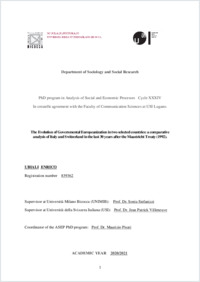The evolution of governmental Europeanization in two selected countries : a comparative analysis of Italy and Switzerland in the last 30 years after the Maastricht Treaty (1992)
- Ubiali, Enrico
- Stefanizzi, Sonia (Degree supervisor)
- Villeneuve, Jean-Patrick (Degree supervisor)
- 2022
PhD: Università della Svizzera italiana
Europeanization
New institutionalism
Historical institutionalism
Path dependence
Italy
Switzerland
Institutional trust
Neutrality
English
This thesis aims to study governmental Europeanization as a process of governmental internationalization, addressed to a progressive approximation to the European Union. Since this topic has been deeply studied by several scholars, we decided to tackle a comparative case study analysis, choosing Italy (ITA) and Switzerland (CH) as units of analysis. The logic behind this study relies on the comparison of a European founding State (ITA) with a neutral country with a strong interdependence with the European Union (CH). The object of the analysis is to study how our units of analysis strengthened their relationship with the EU supranational institutions in the last 30 years. We identified two specific paths of governmental internationalization, focusing on their strategy of governmental Europeanization: Italy through “full membership” in the European institutional framework, and Switzerland through “ad hoc” bilateral agreements, identifiable in the literature as “relative Europeanization”. Despite partially sharing their borders, Italy and Switzerland seemed to embrace the Mill’s “most different criterion” while discussing socio-political aspects. At the same time, both countries seem to care about economic integration in a very similar way. The characteristics of their socio-political and economic background let us identify new institutionalism as the most appropriate lenses for studying this topic. New institutionalism allows us to measure the pervasive influence of institutions on the socio/political/economic environments through rules, norms, and other frameworks. More specifically, the branch of historical institutionalism is expected to let us identify the evolution of Europeanization strategies in a diachronic logic, considering 1992 (a crucial year because of the Maastricht Treaty) as the starting point of our analysis. Path dependence theory, the flagship of historical institutionalism, guides the overall explanation tracking two parallel ways of Governmental Europeanization: one keener to delegate power to the EU supranational level, the other keener to defend its political autonomy based on neutrality. As we said, those paths are parallel and addressed towards the same goal: benefitting a wider market, getting opportunities from social exchanges and from a community that shares similar social values. The originality of this thesis is not only based on the considered cases but especially on how approaching them, to interpret the logic of governmental Europeanization during a crucial arch of time and starting from different countries’ constitutional values. After a pertinent analysis of the academic literature about the abovementioned topics, we will introduce the research design and the selected indicators to present empirical evidence from secondary data coming from international surveys, supporting the overall analysis.
- Collections
- Language
-
- English
- Classification
- Information, communication and media sciences
- License
-
License undefined
- Open access status
- green
- Identifiers
-
- NDP-USI 2022COM003
- URN urn:nbn:ch:rero-006-121154
- ARK ark:/12658/srd1321034
- Persistent URL
- https://n2t.net/ark:/12658/srd1321034
Statistics
Document views: 231
File downloads:
- 2022COM003: 204
